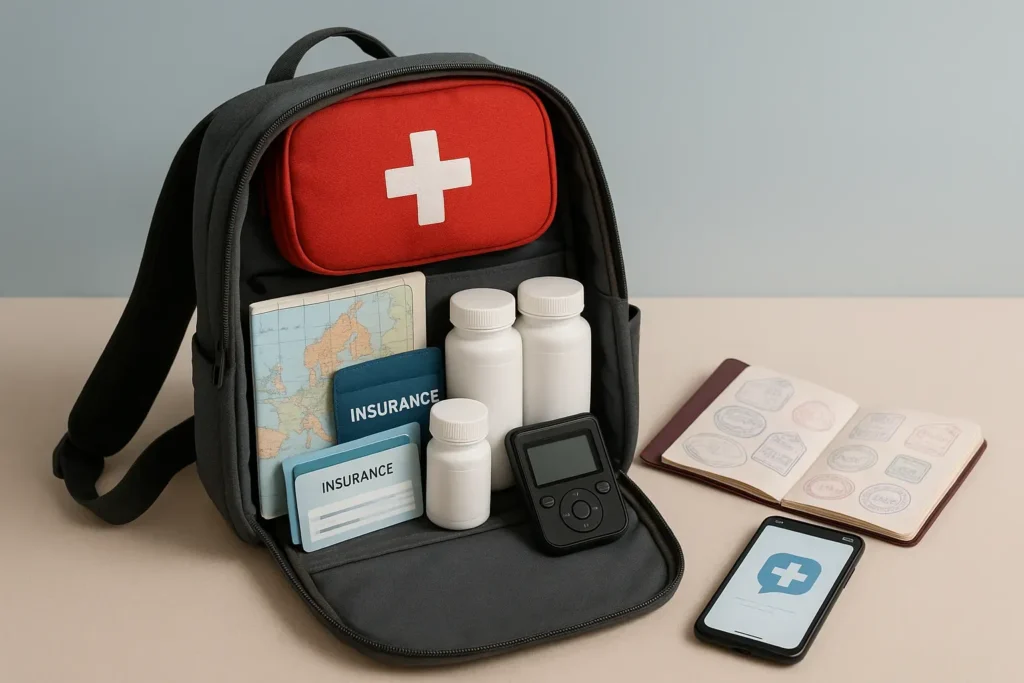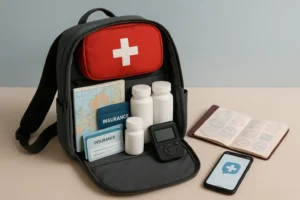Healthcare abroad presents unique challenges that experienced travelers have learned to overcome through preparation and knowledge. This comprehensive guide shares practical advice from healthcare experts and seasoned international travelers on accessing quality medical care overseas. Readers will discover proven strategies for researching facilities, securing appropriate insurance coverage, and developing contingency plans before embarking on their journeys.
- Online Consultations Connect You With Local Doctors
- Proactive Research Creates Access to Quality Healthcare
- Prepare Flexible Backup Plans For Foreign Healthcare
- Secure International Coverage Before Traveling Overseas
- Trust Global Standards When Seeking Care Abroad
Online Consultations Connect You With Local Doctors
I’ve had to deal with health issues a couple of times while traveling – once during a 2-month trip to Canada (coming from Europe, I had no idea how their system worked), and another time during a 2-week stay in Austria. Both times, what saved me was an app called AirDoctor (I’m not affiliated with them, just a big fan). It connects you with local English-speaking doctors for online consultations, and in both cases the doctor was able to issue a prescription for antibiotics that I could fill at the local pharmacy without hassle. Having that option was a lifesaver.
My biggest tip: when you’re abroad and uncertain about the healthcare system, don’t wait until things get worse – turn to online consultations. They can bridge the gap quickly and give you peace of mind when you’re in an unfamiliar environment.

Proactive Research Creates Access to Quality Healthcare
As Co-Founder and CXO of City Unscripted, and a mum, it’s essential to be PROACTIVE in ensuring that we have coverage for healthcare when traveling overseas. That involves researching doctors and hospitals, getting international insurance that includes evacuation (if you don’t already have it), and pre-qualifying vetted, English-speaking medical professionals. Traveling to Barcelona, when Sakura had bad allergies and you knew how to say “runny nose” in Spanish? I could pull up lists of pediatric clinics and pharmacy protocols, carry insurance cards — anything that helped us get the relevant care without going to an emergency room.
MY TOOL LIST: I HAVE A CLOUD-BASED COPY OF MY MEDICAL RECORDS, VACCINE HISTORY, RX INFO ALL AVAILABLE OFFLINE. I research the health requirements, locate international hospitals that take our insurance and program emergency numbers, including embassies’ medical assistance lines for translation and referrals.
It is vital to get good international health insurance with strong evacuation coverage, NOT weak travel insurance. Know some basic medical terms in the local language and bring a copy of prescriptions in generic and brand names when you travel. Finally, keep in mind that the quality of healthcare differs by country and may influence expectations and care practices.

Prepare Flexible Backup Plans For Foreign Healthcare
Navigating a foreign healthcare system is more about preparing flexible, reliable backup plans. Before leaving, check whether your insurance covers international care and, if not fully covered, purchase a supplemental travel health policy that includes emergency evacuation. Once in-country, you can register with the local embassy to receive alerts and a list of clinics with English-speaking physicians. Depending on the length of your stay, it can also be beneficial to carry a translated copy of your medical history, allergies, and prescriptions, which can make pharmacy visits and urgent care encounters smoother.
For daily support, tap into local networks. Expats often share recommendations for trustworthy clinics on forums or social media groups, and those tips are often more practical than any guidebook. Furthermore, carry a small health kit with common over-the-counter medicines for immediate use. Another critical step is knowing the emergency number in the country that you are staying in; it might not be 911. Bookmark nearby hospitals on Google Maps in advance.
For others in similar situations, I’d recommend securing insurance that works abroad and reading the fine print about claims. Keep your essential medical information translated and accessible. Lastly, lean on local and expatriate communities for firsthand guidance. Healthcare systems differ in speed, structure, and paperwork, but with preparation and openness to local practices, you can manage both routine and unexpected care with far less stress.

Secure International Coverage Before Traveling Overseas
Securing international health coverage before travel proved essential. During a project visit overseas, a sudden illness required care at a private clinic, and the upfront costs would have been prohibitive without insurance that offered direct billing. Beyond coverage, the most useful resource was connecting with local partners who recommended trusted providers, which saved time and reduced uncertainty in an unfamiliar system. For others, I recommend three steps: confirm your insurance policy includes international emergency care, research how prescriptions are handled in the destination country, and identify at least one reputable clinic or hospital before arrival. Preparation avoids delays and financial strain, and it allows focus on recovery rather than logistics during stressful moments abroad.

Trust Global Standards When Seeking Care Abroad
While travelling abroad, I realized that the healthcare journey is about treatment and trust in the system. I leaned on our industry experience to recognize when a clinic used supplies from reputable global manufacturers. That awareness reassured us about the standards of care being delivered. It eased the stress that often comes when you are far from home and in need of medical help.
To others, preparation starts before the trip. It is important to know where the nearest internationally accredited hospital is and to download local healthcare apps if they are available. Keep emergency numbers and embassy contacts ready in case of need. Reliable information and awareness of trusted medical suppliers create a strong safety net for travelers in unfamiliar places.












